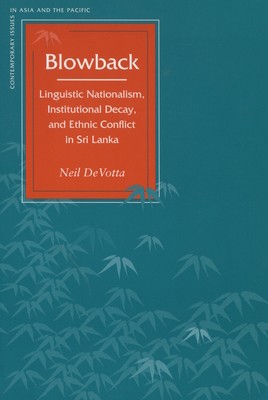
- We will send in 10–14 business days.
- Author: Neil DeVotta
- Publisher: Stanford University Press
- ISBN-10: 0804749248
- ISBN-13: 9780804749244
- Format: 15.9 x 22.9 x 1.8 cm, softcover
- Language: English
- SAVE -10% with code: EXTRA
Reviews
Description
In the mid-1950s, Sri Lanka's majority Sinhalese politicians began outbidding one another on who could provide the greatest advantages for their community, using the Sinhala language as their instrument. The appeal to Sinhalese linguistic nationalism precipitated a situation in which the movement to replace English as the country's official language with Sinhala and Tamil (the language of Sri Lanka's principal minority) was abandoned and Sinhala alone became the official language in 1956. The Tamils' subsequent protests led to anti-Tamil riots and institutional decay, which meant that supposedly representative agencies of government catered to Sinhalese preferences and blatantly disregarded minority interests. This in turn led to the Tamils' mobilizing, first politically then militarily, and by the mid-1970s Tamil youth were bent on creating a separate state.
EXTRA 10 % discount with code: EXTRA
The promotion ends in 15d.18:39:12
The discount code is valid when purchasing from 10 €. Discounts do not stack.
- Author: Neil DeVotta
- Publisher: Stanford University Press
- ISBN-10: 0804749248
- ISBN-13: 9780804749244
- Format: 15.9 x 22.9 x 1.8 cm, softcover
- Language: English English
In the mid-1950s, Sri Lanka's majority Sinhalese politicians began outbidding one another on who could provide the greatest advantages for their community, using the Sinhala language as their instrument. The appeal to Sinhalese linguistic nationalism precipitated a situation in which the movement to replace English as the country's official language with Sinhala and Tamil (the language of Sri Lanka's principal minority) was abandoned and Sinhala alone became the official language in 1956. The Tamils' subsequent protests led to anti-Tamil riots and institutional decay, which meant that supposedly representative agencies of government catered to Sinhalese preferences and blatantly disregarded minority interests. This in turn led to the Tamils' mobilizing, first politically then militarily, and by the mid-1970s Tamil youth were bent on creating a separate state.


Reviews